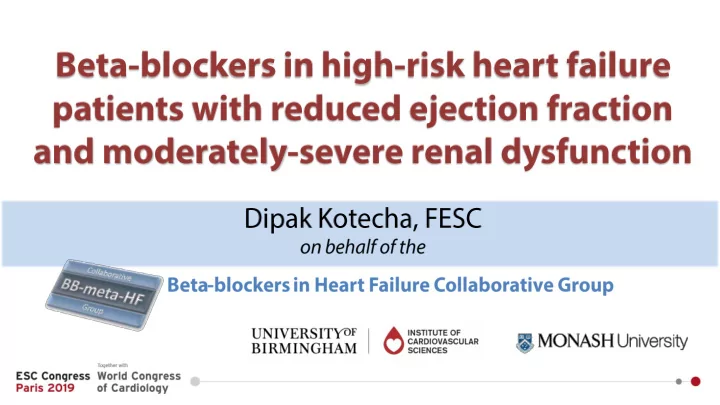

In memory of the late Philip Poole Wilson , Henry Krum and Doug Altman Lancet 2014;384:2235 BMJ 2016;353:i1855 JACC 2017;69:2885 EHJ 2018;39:26
Renal dysfunction is common in heart failure patients and associated with worse outcomes Randomised trials typically exclude patients with significant renal impairment Previous studies based on sub-groups of trials have lacked sufficient patients to make any robust conclusions on those with moderate or moderately-severe renal dysfunction This has implications for clinicians and the assumed effectiveness of treatment, impacting on prescription of guideline-recommended therapy, dosage given and the maintenance of drugs
▪ Randomised controlled trials ▪ Reporting mortality as a major trial endpoint ▪ Unconfounded head-to-head ▪ Planned >6m follow-up ▪ >300 patients (accounts for >95% of eligible RCT participants) Pooling of individual patient data from 18,637 heart failure patients in double-blind RCTs according to a published extraction and analysis plan. Kotecha et al: Syst Rev 2013;2:7
// Median age: 65 years (55-72) Women: 23% Median LVEF: 27% (21-33%) ACE inhibitors: 95% MRA: 9%
12% increase in the hazard of death for every 10 mL/min lower eGFR (95% CI 10-15%; p<0.001).
Interaction p=0.021 NNT 21.4 NNT 21.5
eGFR worsened by 20% or more from baseline
Lower eGFR in patients with AF: • Median 60 mL/min (compared to 64 in sinus) • eGFR <60 in 48.9% (versus 42.9% in sinus) Higher mortality in AF: • 21% (versus 16% in sinus) during 1.3 years mean follow-up No impact of beta-blockers:
eGFR 30-44 mL/min eGFR 45-59 mL/min eGFR >90 mL/min Discontinuation of study drug Placebo Beta-blocker Placebo Beta-blocker Placebo Beta-blocker Due to any adverse event 20.9% 19.4% 14.9% 14.8% 15.1% 11.0% eGFR 30-44 mL/min eGFR 45-59 mL/min eGFR >90 mL/min Beta-blocker dose achieved Beta-blocker Beta-blocker Beta-blocker >50% of max target dose 76.3% 77.9% 83.8%
Renal impairment is often considered a barrier in clinical practice for the commencement and uptitration of guideline-recommended HFrEF therapy. We have demonstrated with sufficient sample size that beta-blockers are effective in reducing mortality in patients with HFrEF and sinus rhythm, even in those with moderately-severe renal dysfunction (as low as an eGFR of 30-44 mL/min/1.73m 2 ). Despite higher rates of comorbidities, the absolute benefit in this group was similar to patients with preserved renal function. Discontinuation due to adverse events was the same for both beta-blockers and placebo in these double-blind trials and renal function did not appear to worsen, even in those with kidney dysfunction at baseline. Patients who did have worsening renal function had considerably higher mortality risk. These results suggest that renal impairment should not obstruct the prescription and maintenance of beta-blockers in patients with HFrEF.
Recommend
More recommend